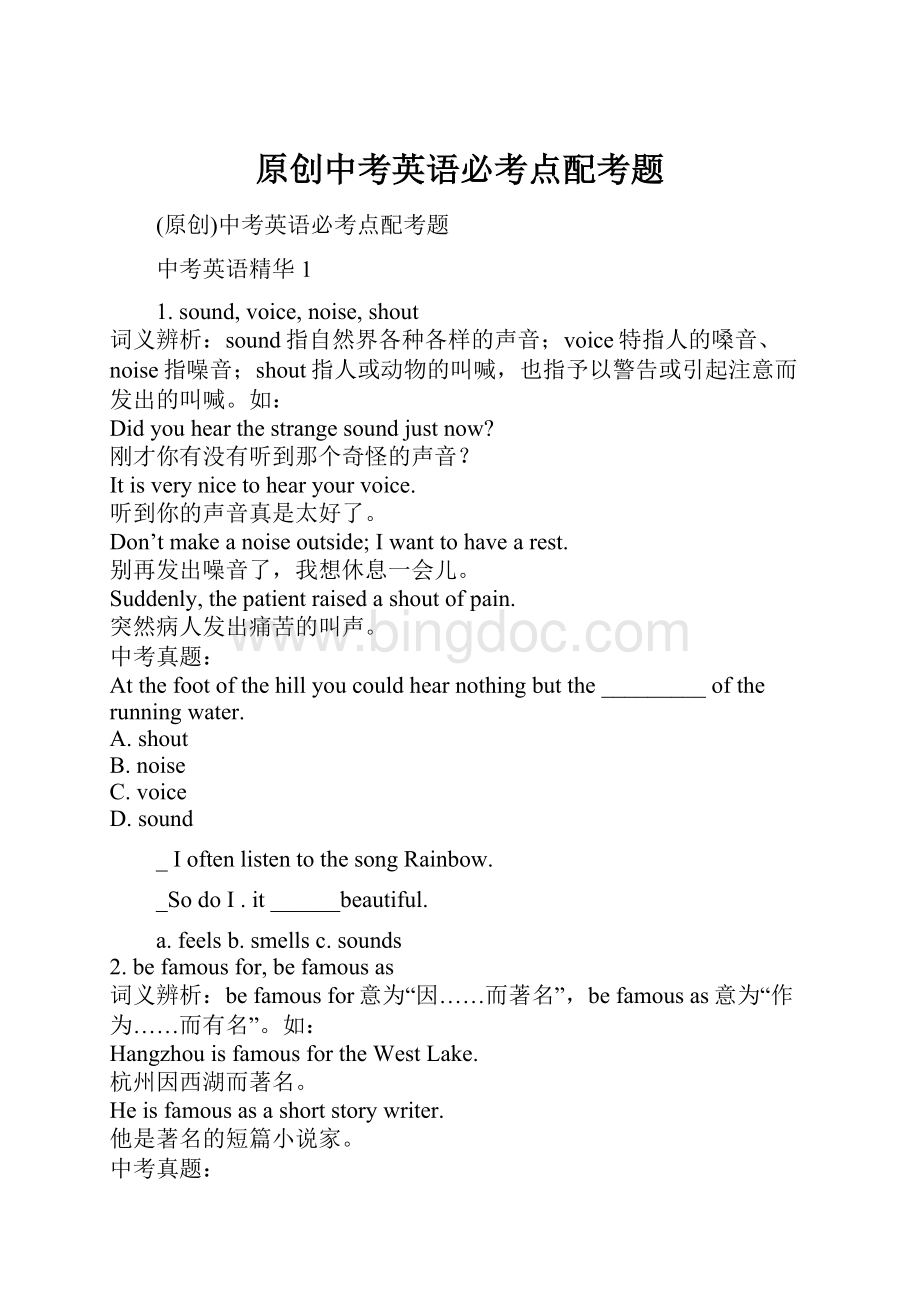原创中考英语必考点配考题.docx
《原创中考英语必考点配考题.docx》由会员分享,可在线阅读,更多相关《原创中考英语必考点配考题.docx(17页珍藏版)》请在冰点文库上搜索。

原创中考英语必考点配考题
(原创)中考英语必考点配考题
中考英语精华1
1.sound,voice,noise,shout
词义辨析:
sound指自然界各种各样的声音;voice特指人的嗓音、noise指噪音;shout指人或动物的叫喊,也指予以警告或引起注意而发出的叫喊。
如:
Didyouhearthestrangesoundjustnow?
刚才你有没有听到那个奇怪的声音?
Itisverynicetohearyourvoice.
听到你的声音真是太好了。
Don’tmakeanoiseoutside;Iwanttohavearest.
别再发出噪音了,我想休息一会儿。
Suddenly,thepatientraisedashoutofpain.
突然病人发出痛苦的叫声。
中考真题:
Atthefootofthehillyoucouldhearnothingbutthe_________oftherunningwater.
A.shout
B.noise
C.voice
D.sound
_IoftenlistentothesongRainbow.
_SodoI.it______beautiful.
a.feelsb.smellsc.sounds
2.befamousfor,befamousas
词义辨析:
befamousfor意为“因……而著名”,befamousas意为“作为……而有名”。
如:
HangzhouisfamousfortheWestLake.
杭州因西湖而著名。
Heisfamousasashortstorywriter.
他是著名的短篇小说家。
中考真题:
Chinaisvery_________theGreatWallandpandas.
A.famousas
B.famousfor
C.readyto
D.readyfor
3.howlong,howoften,howsoon,howfar
词义辨析:
howlong表示“多长”,常用来询问物体长度,也可询问动作或状态延续多长时间,常就for引导的时间段提问;howoften常用来询问频率;howsoon常用来询问某人要过多久才能做某事。
如:
Howlonghaveyouworkedinourschool?
你在我们学校工作了多长时间?
Howoftendoyouseeafilm?
Onceeveryfourweeks?
你多长时间看一场电影?
每四周一次吗?
Howsooncanwehaveaholiday?
Inaweek?
还要过多久我们才能有假期?
一周吗?
中考真题:
—________areyougoingtostayinBeijing?
—Aboutfivedays.
A.Howlong
B.Howoften
C.Howsoon
-Couldyoutellme______isitfromhometoschool?
-Sure.Itisaboutthreekilometers。
Itisabouttenminutes’ride
A.howmuchB.howlongc.howfarD.howsoon
4.one,it
词义辨析:
one表示与上文中提到的同类物品,而it则指上文所提到的物品。
如:
HehasboughtanewbikeandI’llbuyone,too.
他买了一辆新自行车,我也想买一辆。
Thisismybook,soyoucan’ttakeit.
这是我的书,所以你不能拿。
中考真题:
—MypenislostandIcan’tfinditanywhere.
—Soyouwillhavetobuy_________.
A.it
B.few
C.one
D.any
—YesterdayIlostmypencilsharpener.Icouldn’tfind_______.
—Oh,it’sapity.You’dbetterbuy________thisafternoon.
A.it;itB.it;oneC.one;itD.one;one
CanIuseyoure-dictionary?
Sorry,Idon’thave______
a.itb.thisc.thatd.one
5.stayup,wakeup,getup
词义辨析:
stayup意为“熬夜;不睡觉”,相当于situp;wakeup意为“醒来”;getup意为“起床”。
如:
Thegirlstudiesveryhardandsheoftenstaysup.
这女孩学习很认真,经常熬夜。
Iusuallywakeupatsevenbutgetupathalfpastseven.
我通常七点醒来,七点半起床。
中考真题:
—Don’t_________toolate,oryouwillfeeltiredinclass.
—Iwon’t,Mum.Goodnight!
A.wakeup
B.getup
C.standup
D.stayup
6.another/theother/other/others/theothers
Ⅰ.another指不定数目中的“另一个、又一个”(三个以上)用来代替或修饰可数名词。
如:
Idon’tthinkthecoatisgoodenough.Canyoushowmeanother?
Ⅱ.other泛指“另外的”修饰复数名词。
如:
WestudyChinese,maths,Englishandothersubjects.
Ⅲ.others泛指“另外的人或物”,但不指其余的人或物的全部。
如:
Somelikeswimming,otherslikeboating.
Don’talwaysthinkofyourself;youshouldalsothinkofothers.
别老是想着自己,你应该为别人着想。
Ⅳ.theother指两个中的“另一个”如:
Hehastwosons,oneisinShanghai,theotherisinBeijing.
Ⅴ.theothers特指某一范围内的“其余全部的人或物”或“theother+复数名词如:
Therearethirtybooksonthebookshelf.Fivearemine,theothersaremyfather’s.
中考真题:
Wehadapartylastmonth,anditwasfun.Whydon’twehave_________onethismonth?
A.more
B.another
C.theother
-Aretwostudentsenoughtohelpyoucarrythedesk?
-No,thedeskistooheavy.Ineed_______two.
A.otherB.anotherC.theotherD.others.
Howdangerous.Shewasdrivingthecarwithonehandandholdinganicecreamwith_______
a.theotherb.anotherc.othersd.other
7.stay,last
词义辨析:
两词均为不及物动词。
stay意为“保持”,其后常接形容词;last意为“持续”,常与时间段连用。
如:
Theweatherhasstayedhotrecently.
最近天气一直很热。
Thisfilmwilllastabouttwohours.
这场电影大约要放两个小时。
中考真题:
—Iheartheweatherwill________coldforanotherweek.
—Ihopenot.Ihatecoldweather.
A.turn
B.last
C.get
D.stay
8.because/becauseof
Ⅰ.because是连词,后接句子,是主句的直接原因,常用来回答由why引导的特殊疑问句。
如:
1Becauseheisill,heisnotheretoday.因为他病了,所以今天没来。
2--Whyareyouinahurry?
--BecauseIwanttocatchthefirstbus.
Ⅱ.becauseof后接名词或代词,相当于名词词组。
如:
Hecan’tcomebecauseofillness.他生病了,所以没来。
中考
Hehadtoretire(退休)early_________poorhealth.
A.asaresultB.becauseC.soD.becauseof
9.always/often/often/usually/sometimes/never
:
never(0%)→sometimes(20%)→often/(70%)→usually(75%)→always(100%)
这几个词都是表频度的副词,从不—→有时—→时常—→通常—→总是
Doyouoftengotothegym?
No,___________.Idon’tlikesportsatall.
A.alwaysB.neverC.sometimesD.usually
-Bobis---------lateforschool.
-Meneither.
a.alwaysb.almostc.everd.never
10.saytalktellspeak
用法
-Shallwegoand________hellototheforeignteachers?
-goodidea.Let’sgo.
A.sayB.SpeakC.talkD.shout
“Don’t___tostrangersonyourwaytoandfromschool,”motheroften__tome.
A.speak,saysB.speak;tellsc.talk;speaksd.talk;tells
10.afew/few/alittle/little
Ⅰ.afew和few修饰可数名词,alittle和little修饰不可数名词;afew和alittle表示肯定意义,few和little表示否定意义,可受only修饰。
如:
①Fewpeoplewillagreetotheplanbecauseit’stoodangerous.
②Thistextiseasytounderstandthoughthereareafewnewwordsinit.
1Thereislittlewaterleftinglass.Willyoupleasegivemesome
2Don’tworry,wehavealittletimeleft.
中考题
We‘dbetterwait________moreminutes.IthinkJeffwillcomesoon.
A.afewB.fewC.alittleD.little
-_------------scientificattitudesareneededindevelopingourcity.
-Iagreewithyou.Inthisway,wecanmake_______mistakes.
a.fewer;lessb.less;morec.more;fewer
11.accept/receive
.accept“接受”,表示其行为是由主观意愿决定的。
1Iaccepteditwithoutquestion.我毫无疑问地接受了它。
2Wehaveacceptedhisproposal.我已接受了他的建议。
Ⅱ.receive“接到、收到、受到”表示其行为与主观意愿无关。
如:
1Ireceivedaletterfromhim.我收到了他的来信。
2Hereceivedthepresent,buthedidnotaccept.他收到了礼物,但没有接受下来。
3Hereceivedagoodeducation.他受到了良好的教育。
MyunclecalledandaskmeifIhad______thebirthdaygiftfromhim.
A.inventedB.raisedC.receivedD.ordered
12.across/through
Ⅰ.across“横过、穿过”,指从……的一边到另一边。
含义与on有关。
如:
1Iswamacrosstheriver.我游过这条河(指从此岸到彼岸)
2Let’shelppushthecaracrossthebridge.我们帮着把车子推过桥吧。
Ⅱ.through“穿过、通过”指穿过两边。
是从空间较狭窄的一头穿到另一头。
是从内部穿过,含义与in有关。
如:
1Wewalkedthroughtheforest.我们穿过森林。
2Theriverflowsthroughthecityfromwesttoeast.这条河从西到东流过城市。
13.at/in
Ⅰ.at和in都可用在地点名词前,用at时是把该地方视为一点,用in时则是把该地方看成一个范围。
如:
1Areyourclassmatesplayinginthepark?
你的同学都在公园里玩吗?
2Theyarewaitingforyouatthepark.他们在公园附近(里面)等你。
Ⅱ.at;in&on都可用在表时间的名词前。
在点时间前用at;在表某一天或某一天的某个段时间(morning,evening,day,nightatc)名词前,用on;在段时间名词前(星期;年;月;周等)用in,它还可以表示多久以后如:
1I’llmeetyouateight.我们8:
00钟会面。
2SeeyouonMondaymorning.星期一早上见。
3ThestoryhappenedinMay.故事发生在5月份。
Ihearyourteacherwillbeback_____threeweek’stime.
A.atB.inC.forD.after
Whenwereyouborn?
Iwasborn-------acoldwintermorningin1996.
A.onB.inC.at
IjoinedtheLeague_____May,2009.whataboutyou?
Ihavebeenaleaguemember_______threeyears.
a.in,forb.on,inc.on,ford.in,since
14.feellike/wouldlike
Ⅰ.feellike与wouldlike意思很相近,但feellike后面常跟名词;动名词。
构成:
feellike(doing)sth.而wouldlike一般接名词;动词不定式。
构成:
wouldlike(todo)sth.的句式。
如:
1Ifeellike(having)adrink.=Iwouldlike(tohave)adrink.我想喝一杯。
2Doyoufeelliketalkingawalk.=Wouldyouliketotakeawalk?
你要不要散步?
3Idon’tfeellikeeating.我不想吃东西。
Ⅱ.feellike还表示:
“觉得好像,摸起来像”。
如:
1Itfeelslikesilk.它摸起来像绸缎。
DoyoulikeyournewT-shirt?
Yes.It-------verysoft
a.feelsb.soundsc.smells
15.both/either/neither
三者都是在谈到两个人或东西时用的。
Ⅰ.作代词时:
both“两者都”.either“两者中任何一个”.neither“两者中任何一个都不”。
both作主语时,谓语动词用复数形式。
而either和neither则用单数形式。
如:
1Bothofusareteachers.
2Eitherofyoulikesit.
3Neitheroftheanswerwsisright.两个答案都不对。
4Theybothskatewell.他们两人都会滑冰。
Ⅱ.作形容词时:
both修饰名词的复数形式。
Neither和either修饰名词的单数形式。
如:
1Neitherfilmisverylong.两部电影都不长。
2Youmayuseeitherpencil.你可用这两支笔中的任何一支。
3Bothpencilsareblue.两支铅笔都是蓝色的。
Ⅲ.作连词时:
neither与nor连用,“既不……也不……”;either和or连用:
“或是……或是……”“要么……要么……”连接两个主语时,谓语动词遵循就近原则。
而both却与and相连。
连接主语时谓语动词用复数。
如:
1NeitherJacknorIhaveseenthefilm.杰克和我都没看过这影片。
2EitheryouorIamwrong.不是你错就是你错。
BothJohnandMikearegoodatswimming.约翰和麦克都擅长游泳。
中考链接
-WillyoucomeoverfordinneronMondayorTuesday?
-I‘mafraid___dayisok.I’llflytoParisonholidayforthewholeweek.
A.neitherB.eitherC.both
-Mom,whenshallwegotoKunmingmuseumthisweekend?
-Oh,sorry.I’mgoingtoBeijingforameeting._____Saturday____Sundayisok.
A.Neither;norB.Both;andC.Either;orD.notonly;butalso
-------Lisa________Lucymaygowithyoubecauseoneofthemmuststayathometotakecareofthedog。
A.notonly;butalsoB.Neither;norC.Both;andD.Either;or
_Youhavetriedseveralshirts.
_Sorrytotakeuptoomuchofyourtime.But______ofthemlookgoodonme
a.neitherb.anyc.noned.both
15.Hard/hardly
16.sometimesometimesometimes
Hesaidhewouldcometoseeus___thenextafternoon.
a.sometimeb.sometimec.sometimesd.sometimes
16.dress/puton/wear/in/tryon
Ⅰ.dress“穿”指穿的动作,也指其状态。
如:
1Hismotherdressedhiminnewclothes.他的母亲给他穿上了新衣服。
2Getupanddressquickly.快起床穿衣。
3Shedressesneatly.他穿着整齐。
[注]:
作vt,直接对象是人,而不是穿的衣服;作vi时,不能表穿什么衣服。
Ⅱ.puton“穿;戴”强调其动作。
如:
1Putonyourcoat.穿上大衣。
2Heputonhishatandwentout.他戴上帽子出去了。
反义词
Ⅲ.wear“穿;戴”强调其状态。
如:
1Hewearsacoat.他穿着大衣。
2Theteacherwearsglasses.老师戴着眼镜。
Ⅳ.in“穿;戴”是介词。
它构成的短语作定语或表语表其状态。
其后还可接表颜色的词。
如:
①Sheisinacoat.她穿着大衣。
Theboyinblueismybrother.②那个穿蓝色衣服的男孩是我的弟弟。
Ⅴ.tryon“试穿/戴”如:
MayItryonthisdress..请到裁缝店去试穿一套衣服。
Maryisusedto__________aT-shirtandjeans.
A.wearB.putonC.wearingD.puttingon
-Thesweaterisverynice.I‘lltakeit
-Butyou’dbetter--------first.Ithinkitisali